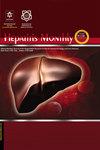慢性戊型肝炎病毒感染患者口服锌补充剂对利巴韦林单药治疗无效
IF 0.6
4区 医学
Q4 GASTROENTEROLOGY & HEPATOLOGY
引用次数: 1
摘要
背景:慢性戊型肝炎病毒(HEV)感染在免疫抑制个体中可能发展为终末期肝病。利巴韦林治疗对大多数慢性HEV患者有效,但仍有10%没有持续的病毒学反应(SVR)。目的:我们旨在研究补充锌是否可以作为治疗这些患者的一种方法。方法:对利巴韦林单药治疗未达到SVR的慢性戊型肝炎患者进行体外(亚基因组-复制子系统)、体内(家兔模型)和回顾性研究锌盐的抗病毒特性。结果:锌能抑制HEV基因3型的体外复制。在免疫功能正常的兔急性HEV感染模型中,与利巴韦林单药治疗相比,锌+利巴韦林并没有提高病毒清除率。在对利巴韦林无效的慢性hev感染患者(n = 12)中,4/12(33%)接受额外锌补充的患者观察到病毒清除。结论:口服锌是一种廉价、无害的膳食补充剂,对于少数接受利巴韦林单药治疗的无SVR的慢性戊型肝炎患者可能是一种潜在的拯救治疗选择。需要进一步的研究来阐明锌在HEV中的作用。本文章由计算机程序翻译,如有差异,请以英文原文为准。
Oral Zinc Supplementation in Chronically HEV-Infected Patients Not Responding to Ribavirin Monotherapy
Background: Chronic hepatitis E virus (HEV) infection may progress to end-stage liver disease in immunosuppressed individuals. Ribavirin therapy is efficient in most chronic HEV patients, but 10% remain without a sustained virological response (SVR). Objectives: We aimed to study whether zinc supplementation could represent a therapeutic approach in these patients. Methods: Antiviral properties of zinc salts were studied in vitro (subgenomic-replicon system), in vivo (rabbit model), and retrospectively in patients with chronic hepatitis E who did not achieve SVR under ribavirin monotherapy. Results: Zinc inhibited HEV genotype-3 replication in vitro. In a model of acute HEV infection in immunocompetent rabbits, zinc + ribavirin did not improve viral clearance compared to ribavirin monotherapy. In chronically HEV-infected patients not responding to ribavirin (n = 12), viral clearance was observed in 4/12 (33%) patients receiving additional zinc supplementation. Conclusions: Oral zinc, an inexpensive, harmless dietary supplement, could potentially represent a rescue treatment option for a few patients with chronic hepatitis E without SVR under ribavirin monotherapy. Further studies are needed to elucidate the role of zinc in HEV further.
求助全文
通过发布文献求助,成功后即可免费获取论文全文。
去求助
来源期刊

Hepatitis Monthly
医学-胃肠肝病学
CiteScore
1.50
自引率
0.00%
发文量
31
审稿时长
3 months
期刊介绍:
Hepatitis Monthly is a clinical journal which is informative to all practitioners like gastroenterologists, hepatologists and infectious disease specialists and internists. This authoritative clinical journal was founded by Professor Seyed-Moayed Alavian in 2002. The Journal context is devoted to the particular compilation of the latest worldwide and interdisciplinary approach and findings including original manuscripts, meta-analyses and reviews, health economic papers, debates and consensus statements of the clinical relevance of hepatological field especially liver diseases. In addition, consensus evidential reports not only highlight the new observations, original research, and results accompanied by innovative treatments and all the other relevant topics but also include highlighting disease mechanisms or important clinical observations and letters on articles published in the journal.
 求助内容:
求助内容: 应助结果提醒方式:
应助结果提醒方式:


